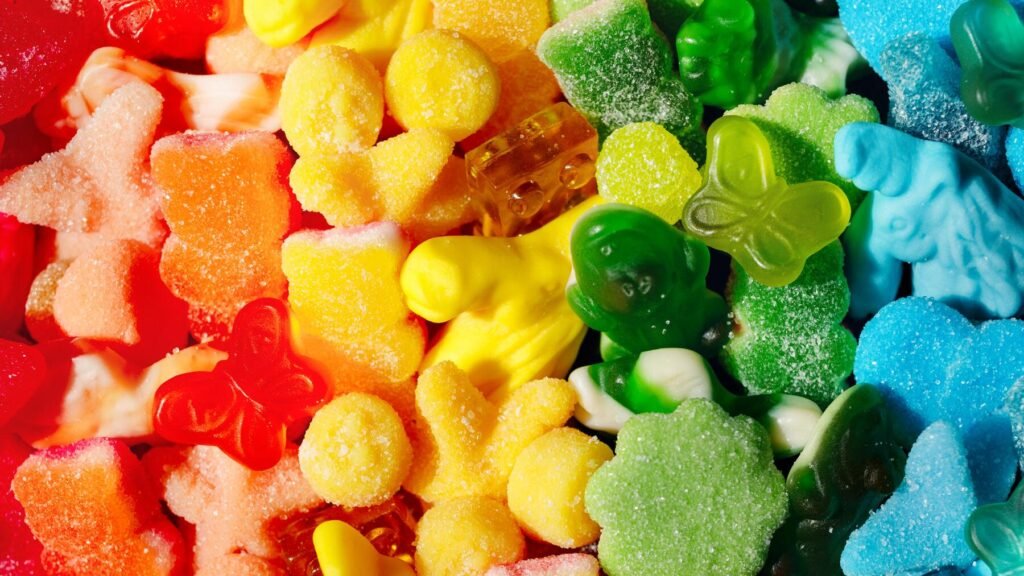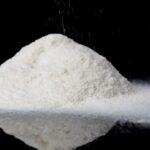Fumaric acid in sour candy can hurt your teeth. It can cause tooth enamel to wear away and lead to tooth decay. When you eat sour treats, acids remove minerals from your enamel. This makes your teeth weaker. Your teeth can get cavities and wear down faster.
- The World Health Organization says 60-90% of kids get cavities and lose teeth. This mostly happens because of acidic foods and sour candies.
- Studies show sour candies can damage teeth more than many acidic drinks.
- Sour foods and acidic drinks are more popular now. This makes oral health problems more common.
If you like sour candies, you should know that eating too many acidic foods and drinks can hurt your teeth. It can raise your risk for tooth wear and cavities.
Fumaric Acid in Sour Candy

What Is Fumaric Acid?
Have you ever wondered why sour foods taste so strong? Fumaric acid is an ingredient that makes candies taste very tart. This acid is a white powder with no smell. It tastes fruity and sour. Fumaric acid is found in nature. It is in some plants, mushrooms, and lichens. Your body also makes fumaric acid when it creates energy. This shows it is important for your body.
Fumaric acid has a special chemical shape. It has two acid groups on each side of a double bond. This shape helps it stay strong and last longer in your mouth. You can find fumaric acid in other foods too. It helps control how sour foods taste. It is used in drinks, jams, sauces, and dairy foods to make them taste better.
Fun fact: Fumaric acid is the strongest acid in sour foods. It dissolves slowly, so the sour taste stays on your tongue longer.
Why Is It Used in Candy?
If you like sour candy, you have tasted the strong flavor from fumaric acid. Candy makers use fumaric acid because it makes candy very sour with just a little bit. It is stronger than citric acid, which is used in most sour candies. You only need half as much fumaric acid to get the same sour taste as citric acid. This makes it a good choice for candy that needs to taste sour for a long time.
Here are some other acids you might find in sour foods:
- Citric acid: Makes candy taste a little sour.
- Malic acid: Makes candy taste even more sour.
- Tartaric acid: Gives a sharp, biting sourness.
- Fumaric acid: Makes candy taste the sourest and lasts the longest.
Fumaric acid also helps gummy candies keep their shape. It works well with gelling agents, even when it is hot. You can find fumaric acid in many sour foods, not just candy. It helps keep drinks fresh, jams tasty, and baked goods soft.
| Acid Type | Sourness Level | Dissolvability | Common Use in Candy |
|---|---|---|---|
| Citric Acid | Moderate | Fast | Most sour candies |
| Malic Acid | Strong | Fast | Extra sour candies |
| Tartaric Acid | Sharp | Moderate | Some gummies |
| Fumaric Acid | Very strong | Slow | Highly acidic candies |
If you like sour foods, remember the acids in them can affect your teeth. Fumaric acid is special because it keeps the sour taste going. That is why it is used in many sour treats.
How Fumaric Acid Damages Tooth Enamel and Causes Decay
How Acids Damage Teeth
When you eat sour candy, acids start to work on your teeth fast. These acids make your mouth more acidic by lowering the pH. The hard outside layer of your tooth is called dental enamel. This layer faces a big challenge from acids. The main mineral in enamel is hydroxyapatite. Acids send hydrogen ions to attack this mineral. This breaks down hydroxyapatite and lets out calcium and phosphate. This is called demineralization. If the pH goes below 5.5, your enamel starts to dissolve.
You might see damage from acidic drinks after eating sour candy. Fumaric acid keeps your mouth acidic for a long time. Hard candies and sprays with fumaric acid can make the pH drop even lower, sometimes below 2.3. This means your teeth are under attack for longer. These candies can hurt your teeth more than many acidic drinks.
Tip: If your teeth tingle or feel very sour after candy, your enamel is probably losing minerals.
Mineral Loss from Enamel
Every time you eat sour candy, your teeth lose minerals. Fumaric acid makes calcium and phosphate leave your enamel. This is called demineralization. Your saliva tries to help by bringing minerals back. But if you eat sour candy a lot, saliva cannot keep up. Acidic drinks can also hurt your teeth in the same way. These drinks and candies make mineral loss worse.
Here’s what happens when you lose minerals:
- Hydroxyapatite crystals break apart.
- Calcium and phosphate ions leave the enamel.
- The surface of your tooth gets weaker and thinner.
- Demineralization makes your teeth hurt with hot, cold, or sweet foods.
Fumaric acid is strong because it dissolves slowly. This means your teeth stay in contact with acid longer. Other acids, like citric and phosphoric acid, are also strong. Citric acid can grab calcium even after the pH goes up. Phosphoric acid is in sodas and can also wear down teeth. How much acid is in your mouth and how long it stays there both matter.
Increased Risk of Cavities
When your enamel gets thin, your teeth can get cavities more easily. Fumaric acid and other acids in sour candy make this problem worse. Dental erosion can cause tooth sensitivity, color changes, and cracks. You might see shiny or rough spots on your teeth. Sometimes, you see small dents or holes. These are signs of dental erosion and demineralization.
If you eat sour candy a lot, acids keep your mouth acidic. This raises your risk for dental caries and tooth decay. The sugar in candy feeds bacteria in your mouth. These bacteria make lactic acid, which adds to the damage. This mix of acids makes your enamel even weaker.
Here are some early signs of dental erosion and decay:
- Your teeth hurt with hot, cold, or sweet foods.
- Your teeth look yellow or darker as enamel gets thin.
- You see small cracks or chips in your teeth.
- Your teeth look smooth and shiny from enamel loss.
- You see tiny holes or dents on the chewing surface.
If you see these signs, you should do something. Rinse your mouth with water after eating sour candy. Wait before brushing your teeth. Use toothpaste for sensitive teeth. Go to your dentist for check-ups. These steps help protect your teeth from acids and keep your smile healthy.
Note: Eating less sour candy and drinking fewer acidic drinks helps lower your risk for dental erosion, tooth decay, and dental caries. Good choices help your oral health.
Protecting Your Teeth from Fumaric Acid
Rinse with Water After Sour Candy
You just finished a sour candy and your mouth feels super tangy. What should you do next? Grab some water and rinse your mouth. Pediatric dentists say rinsing with water after eating sour candy helps wash away sticky residue and dilute acids. This simple step lowers the acid level in your mouth and helps protect your teeth. Swishing water coats your teeth with a neutral liquid, raising the pH closer to normal. If you have dry mouth, rinsing is even more important because saliva cannot do its job as well.
Here’s a quick look at how rinsing helps:
| Aspect | Explanation |
|---|---|
| pH of sour candy | Around 4 or below, very acidic |
| pH of water | Neutral at 7 |
| Effect of rinsing | Washes away acid, raises pH, protects enamel |
Tip: If you cannot brush right away, rinse with water and chew sugarless gum to boost saliva. This helps fight acid and keeps your oral environment healthy.
Wait Before Brushing After Sour Candy
You might think brushing right after eating sour candy is smart. Actually, it can hurt your teeth. Sour candies contain acids like fumaric acid that soften enamel. Brushing too soon can scrub away this softened layer. Dental experts recommend waiting at least 30 minutes, or even up to an hour, before brushing. This gives your enamel time to recover and remineralize. If you have dry mouth, waiting is extra important because your saliva needs time to help your oral surfaces heal.
- Wait about one hour before brushing after sour candy.
- Rinse with water right away to start the healing process.
- Use a soft-bristled toothbrush for gentle cleaning.
- Chew sugarless gum or eat cheese to help neutralize acids.
Note: Brushing immediately after sour candy can cause more enamel damage. Give your oral tissues time to recover.
Limit Sour Candy for Healthier Teeth
You love sour treats, but eating them too often can harm your oral health. Studies show that frequent sour candy intake leads to more enamel erosion and tooth decay. Sour candies stick to your teeth and keep acids in your mouth longer. If you have dry mouth, acids stay around even longer, raising your risk for damage. Try to enjoy sour candy only sometimes, not every day.
- Limit how often you eat sour candy.
- Drink water after sour treats to wash away acids.
- Choose snacks that are less acidic for better oral hygiene.
- Visit your dentist for regular checkups to catch problems early.
Remember: Cutting back on sour candy helps protect your enamel and lowers your risk for cavities. Your oral health will thank you!
Sour candy tastes fun, but it can hurt your teeth. You face risks like enamel erosion and tooth decay because these treats have strong acids. Dental research shows sour candies have lower pH and higher acidity, which means deeper enamel damage. Artificial saliva helps a little, but not enough when acids are strong. If you eat sour candy often or have dry mouth, your risk goes up.
- Limit how much sour candy you eat.
- Rinse with water after enjoying candy.
- Wait before brushing your teeth.
- Brush and floss every day.
You can still enjoy sour treats if you care for your smile. Smart choices and good habits help you keep your teeth healthy and bright! 😁
FAQ
Can sour candy cause permanent tooth damage?
Yes, sour candy can cause lasting damage. The acids weaken your enamel, making your teeth more sensitive and prone to cavities. If you eat sour candy often, you might notice changes in your teeth that don’t go away.
How soon should you brush your teeth after eating sour candy?
Wait at least 30 minutes before brushing. Your enamel needs time to recover from the acid. Brushing too soon can scrub away the softened enamel and make things worse.
Is fumaric acid worse for your teeth than citric acid?
Fumaric acid is stronger and lasts longer on your teeth than citric acid. This means it can do more damage if you eat a lot of sour candy. Both acids can hurt your enamel, but fumaric acid sticks around longer.
What can you do if your teeth feel sensitive after sour candy?
Try rinsing your mouth with water right away. Use toothpaste for sensitive teeth. Chew sugarless gum to help your saliva protect your enamel. If sensitivity continues, visit your dentist for advice.




